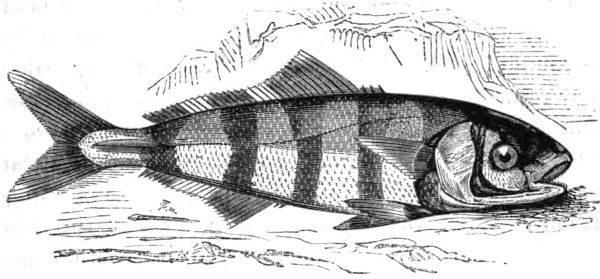Ch. 8
SMALL HARMLESS FISH
Shoals of small harmless fish that for some days before had been placidly swimming by our side, darted away with what seemed shuddering fins, and ranged themselves fore and aft with the stranger’s flanks. Though in the course of his continual voyagings Ahab must often before have noticed a similar sight, yet, to any monomaniac man, the veriest trifles capriciously carry meanings.
Ishmael, “The Pequod meets the Albatross”
In the previous chapter I mentioned the small harmless fish that depart Ahab’s ship in “The Pequod meets the Albatross.” It’s reasonable to imagine these as pilot fish (Naucrates ductor), a silvery blue-striped species well-known to whalemen. (See fig. 22.)
FIG. 22. “The Pilot-fish” in Frederick Bennett’s Narrative of a Whaling Voyage Round the Globe (1840).
Melville had written about pilot fish as omens before he published Moby-Dick. In Mardi his narrator describes the men killing an enormous hammerhead shark. They lance the shark in the head. As it sinks down through its own blood to die, the “nimble Pilot fish” drop their allegiance and swim over beside the men’s boat. “A good omen,” the sailor says: “no harm will befall us so long as they stay.”
In addition to coming from his experiences at sea, some of his ideas on these fish likely derived from, or at least were reinforced by, Francis Allyn Olmsted, who caught and described pilot fish carefully. In 1841 Olmsted explained that pilot fish commonly seek shelter and food by living in the close vicinity of large sharks—“side by side with his ferocious mate”—as well as for days sometimes beneath the hull of slow-moving sailing ships. Pilot fish are not to be confused with remora, the fish that suction themselves to sharks and whales (family Echeneidae). Olmsted wrote that it’s “a trick sometimes practised by a brother whaler” to sail beside another’s hull to get a school of fish to leave and join their ship. Perhaps this is where Melville got the idea for this scene, which he turned into an omen: the first hint that sharkish Ahab is not going to follow the redemptive path of the Ancient Mariner. The captain of the Pequod does not bless these small creatures of the sea that are named after guides to mariners.
Ahab murmurs sadly: “Swim away from me, do ye?”1

